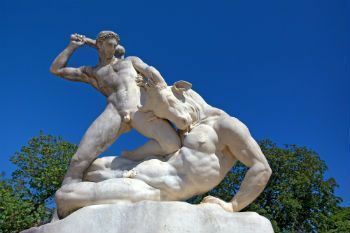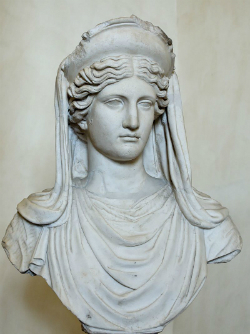In Greek mythology, Jellyfish she was a creature represented by a woman with serpents for hair, fangs of bronze, and wings of gold.
Symbolically, Medusa was tragic, lonely, and a woman incapable of loving and being loved. She hated men for being seduced, and she hated women too, for she couldn't settle for being a monstrous creature.
The myth tells that Medusa was a priestess of the temple of Athena (in some versions she was already the mythical creature, however she had not yet been cursed).
However, Medusa is lovingly harassed by Poseidon, the god of the seas, giving in to her charms by lying down with him in the temple of the goddess Athena.
Therefore, Athena turns her hair into snakes and her face into a horrible countenance capable of turning to stone anyone who meets her eyes.

Thus, Medusa came to live at the western end of the world, next to the entrance to the realm of the dead. Around her lair, several stone statues of men and animals—her victims—adorned the environment.
It is interesting to note that sculptors and painters from the 5th century a. C., represented Medusa as a monster, however, she was very beautiful, as the Roman poet Ovid reports: "Medusa had once been a beautiful woman".
The Myth of the Gorgons
It is noteworthy that Medusa and her sisters are considered a late version of the myth. She would be sister of the Gorgons, Sthenos and Euriale, who were daughters of Forces the ‘Grey-haired, and Cetus, ancient marine deities.
They would also be the progenitors of the Greea, creatures with a single eye and tooth. Ultimately, all these creatures were considered very wise.
Thus, Medusa would then be one of the three Gorgons, the only mortal and who could petrify any flesh with a single look.
Medusa and Perseus
The Medusa myth intersects with another well-known one, that of Perseus. According to the myth, she was beheaded by the hero, who fought the Gorgon looking only at her reflection in the polished shield.

When decapitating her, something unusual happened: two creatures were born, because Medusa was pregnant with Poseidon. Thus came the winged horse Pegasus and the golden giant Chrysaor.
Not only that: Perseus noticed that one vein of the monster was gushing a deadly poison and, in the other, the elixir of eternal life.
After using the decapitated head as a weapon to defeat his enemies, the hero handed the artifact to Athena, who affixed it to the warrior's shield, thus creating the mighty Aegis.
Curiosities: did you know?
- Medusa's face was adopted as a symbol of the feminist struggle.
- from the greek, Jellyfish it means "guardian", "protector" and also "feminine wisdom", if we consider the cult of the Amazons to the serpent goddess in Libya.
- Medusa's sculptures and paintings decorated the roofs of Greek temples and were believed to chase away evil spirits.
- The corals of the Red Sea are attributed to the blood of Medusa, which spattered with the passage of Perseus when he flew over the place with his winged horse.



